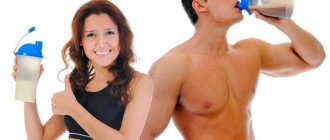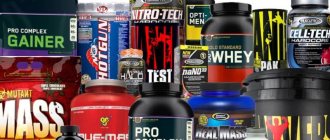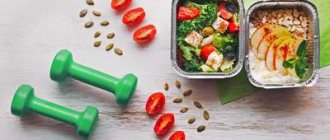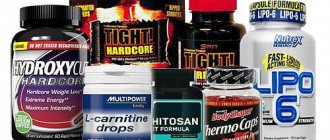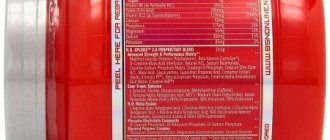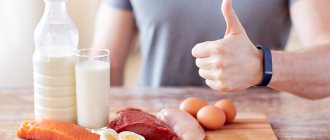Meal replacements[edit | edit code]
| What are meal replacements (nutrition) | |
| Meal replacement products are sold in the form of powders, ready-to-drink shakes and bars. They consist of milk proteins (usually whey protein and/or casein), carbohydrates (maltodextrin and/or sugar), vitamins and minerals. Some brands also contain small amounts of unsaturated fat and other nutrients that manufacturers claim improve performance. Mass gain formulas are very similar to meal replacement formulas, but typically contain more calories in the form of carbohydrates and unsaturated fats to promote growth. | |
| Effect of meal replacements | |
| Meal replacements are a nutritionally balanced and convenient alternative to solid foods. Their purpose is to promote muscle growth and recovery. | |
| Do you need them? | |
| They do not improve performance, but can be a useful and convenient addition to (but not a replacement for) nutrition if you have difficulty eating enough regular food, need to eat on the go, or need the additional nutrients they contain. | |
| Side effects | |
| Side effects are unlikely. |
These supplements include meal replacement powders, ready-to-drink drinks, energy bars, and energy gels. They represent a large segment in sports nutrition (up to 20-30% of sales from most manufacturers). Often these supplements include vitamins and minerals. They usually differ from each other in the percentage of carbohydrates, proteins, fats and fiber (dietary fiber). Most existing products are focused on weight loss.
In addition, meal replacement products may contain substances that promote weight gain/loss and/or improve athletic performance. Most people use them as nutrient-rich snacks and/or to optimize their caloric intake and thereby lose/gain weight. In general, meal replacement powders, ready-to-drink drinks, energy bars and energy gels are a convenient way for athletes to balance their diet, and they also serve as a good alternative to fast food.
The use of this type of supplement allows you to ensure that the body receives carbohydrates, proteins and other nutrients before/after training, when the athlete cannot/considers it undesirable to eat large amounts of food. However, they should serve as a supplement to the main diet, and not as a replacement for it.
How to replace expensive pp products? Proper nutrition at no cost. Budget alternative
“Superfoods” are foods rich in vitamins and minerals that contain large doses of beneficial substances. For example, avocado, salmon, quinoa, Chia seeds and many others. But such a “super front” is not cheap. The average price of lightly salted salmon is 250, 300, or even 400 rubles per 200 grams. What about avocados? From one hundred to two hundred rubles per piece, depending on the variety. Not everyone can afford such proper nutrition. But that doesn't mean you can't stay healthy without expensive fish or almond milk.
Matchamania: why everyone is switching to tea powder and why it is better than coffee
Rumor has it that it even copes with muscle pain.
Many “superfoods” can be found with equally useful analogues. Only the price will be lower. We have selected a budget replacement for expensive “correct” products.
Salmon vs Mackerel
Photo: istockphoto.com
Salmon is easily digestible by the body, contains useful acids, and is rich in vitamins, macro- and microelements. But it is Omega-3 that makes it a “superfood”. The World Health Organization notes that it is an essential fatty acid for humans because the body does not produce it on its own. However, you can get Omega-3 not only from expensive salmon.
Mackerel contains a large dose of not only Omega-3, but also iodine, magnesium, zinc, vitamin A, D and other beneficial substances. It regulates hormone levels, strengthens the immune system - in a word, it is in no way inferior to red fish. But mackerel costs several times less.
Avocado vs Pumpkin Seeds
Photo: istockphoto.com
Avocado is one of the most popular foods among nutrition fans. No PP blog is complete without a recipe for guacamole (avocado sauce) or fruit spread. In addition to fatty acids, avocado contains B vitamins, vitamin E and a large amount of potassium. But this “superfood” also has an inexpensive analogue.
10 most high-calorie foods that may end up in the refrigerator
Interestingly, not all of them are harmful.
Pumpkin seeds contain no less essential fatty acids. Thanks to vitamins A and E, the skin maintains elasticity and youth, and a record amount of zinc fights cancer cells. 50 grams of avocado will replace 30 grams of seeds. You will save money, save on the quantity of product and, most importantly, you will not lose quality.
Quinoa vs Chickpeas
Photo: istockphoto.com
“Overseas” cereal is rich in fiber, folic acid and vegetable protein. The cereal does not contain gluten and can replace meat and poultry, so it is appreciated by vegetarians. But is it worth overpaying for a newfangled product?
Chickpeas are in no way inferior to quinoa. It is also gluten-free, rich in fiber, vitamins, healthy acids and vegetable protein. Moreover, the protein in chickpeas is 18 - 19 g, and in quinoa 14 - 16 g per 100 grams of product. It turns out that chickpeas are not only not inferior, but also winning. It speeds up metabolism, improves digestion and is useful for diabetes. You can make soups, pastas, pilaf, porridge, salads and other healthy dishes from chickpeas.
Blueberry vs Currant
Photo: istockphoto.com
We value blueberries for their low calorie content and rich chemical composition. And she looks very beautiful in photographs with cheesecakes. The berry is good for the heart, vision and nervous system. But not everyone can buy it, much less grow it.
Blackcurrant contains much more vitamin C, calcium, magnesium, sodium, phosphorus, potassium and other elements. It improves skin health, and surpasses apples and pomegranates in the amount of iron. The berry contains a lot of fiber, which helps intestinal function, and its antioxidants slow down aging and normalize blood pressure.
Maple syrup vs honey
Photo: istockphoto.com
Maple syrup is used for meat, fish, milkshakes, cereals, desserts and other dishes. But most often they replace sugar. It has become very fashionable and “correct” to pour pancakes or pancakes with maple syrup. Yes, it contains vitamins and beneficial microelements, but it is not cheap. The average price is from 350 rubles per 200 grams, if we talk about a real product that is really good for the body. By the way, maple syrup is often counterfeited, and instead of natural sugar we buy “something” with its flavor. So why take risks and overpay?
Honey is not only cheaper than maple syrup, but it is also time-tested. It is rich in all vitamins B, K, E, C, macro- and microelements. We have known about the beneficial properties of honey since childhood. You can buy it from a beekeeper so you don’t have to worry about whether it’s natural or not. But maple syrup is brought from Canada. Therefore, decide for yourself which product you should trust.
Chia Seeds vs Sesame
Photo: istockphoto.com
Chia seeds are often added to breakfasts and desserts to add “healthiness”. These grains are really beneficial because they contain plant acids, vitamins, fiber, kill harmful bacteria and lower blood sugar levels. But the “miracle product” costs 100 - 150 rubles per 100 grams.
PP breakfasts for weight loss. How to eat correctly and tasty
Unusual recipes for oatmeal, pancakes and healthy desserts.
A good substitute for Chia seeds is sesame. They are often sprinkled on buns in stores. Sesame seeds are rich in healthy fats, vitamins and easily digestible proteins that will help build muscle mass. Along with chia, sesame lowers cholesterol and blood pressure. But you shouldn’t fry it, because this way you will get an exceptionally aromatic seasoning. To preserve all the beneficial properties, the seeds need to be crushed or soaked.
Cane sugar vs Beet sugar
Photo: istockphoto.com
Cane sugar is usually considered a useful substitute for white sugar. The problem is molasses, which is released during the sugar refining process. It really contains vitamins B6, iron, calcium, magnesium and other substances. But there is practically no sugar in unrefined sugar, which means there are no magical properties either.
Refined cane sugar is no different from beet sugar. But sugar beets are grown in Russia, Ukraine and Europe, and sugar cane is brought from the tropics. It is better to give preference to unrefined brown beet sugar. It becomes dark after adding healthy molasses. And beet sugar is cheaper.
Research[edit | edit code]
In March 2001, The Journal of the American Dietetic Association published an article with a 1-year study on 64 overweight women, ages ranging from 18 to 55 years. The goal was to lose a few kilograms of weight. The subjects were unable to achieve their desired weight on their own by following a low-calorie diet.
After the start of the experiment, half of the women began to follow a diet with a calorie restriction of up to 1200 kcal per day, the other half replaced all three daily meals with meal replacement shakes containing approximately 220 calories, and they also consumed additional fruits and vegetables, which in general was also 1200 kcal per day.
After 3 months, the average weight in both groups decreased by approximately 1.5 - 3 kg, without loss of muscle mass. However, after a year of following the diet plan, the first group regained their original weight, and the second group, taking meal replacement products, continued to lose weight.
Another study (Obesity Research, August 2000) conducted on 100 obese people (21 men and 79 women, age range 35-55 years) was devoted to the study of meal replacement products. For the first three months, half of the subjects followed a 1,200-1,500-calorie diet, the other half took 2 servings of meal replacements per day and 1 full meal of regular foods. After this, it was found that the usual diet provided a weight loss of about 1 kg, while in the second group the weight loss reached 3 kg. Continuation of the experiment also showed the advantage of using additives.
Harm of substitutes
It is dangerous for athletes to completely switch to nutritional replacements. Especially if you do it without preparation. The gastrointestinal tract and all metabolic systems of the body are designed for a certain ratio of different nutritional components. There should be more carbohydrates, less proteins. And many vitamins in bound form in natural fruits and vegetables are absorbed better and easier.
The transition to specialized sports nutrition, the purpose of which is to gain muscle mass, “dry” the body before competitions, lose weight or maximize energy effect, can be justified only for a short period before these very competitions.
Over a short period of time, with such a transition, radical changes in the functioning of internal systems will not occur, but results will be achieved. With a sudden and complete transition to constant nutrition with substitutes, even the most balanced ones, various disorders, hormonal disorders can occur, and in especially advanced cases, the harm from taking food substitutes can even reach ulcers and cancer. Be careful!
Expert reviews[edit | edit code]
Meal replacement products should only be recommended to people who are not experiencing financial difficulties, otherwise there may be other options. All supplements in this class consist of several basic ingredients: protein, complex carbohydrates, vitamins and minerals, healthy fats, dietary fiber (fiber). The other components are not particularly valuable. Thus, you can purchase the main components separately and save up to 80% of costs.
An example of an adequate replacement:
- Complete Protein Serving
- 10 g bran as a source of fiber
- A serving of vitamin-mineral complex
- Omega-3 serving
Side effects[edit | edit code]
Meal replacements are made from common food components found in natural foods. The only difference is that the supplements are free of harmful components (animal fats, cholesterol, fast carbohydrates, etc.) and contain an optimal balance of nutrients. Research shows (Obesity Research magazine, August 2000) that meal replacement products can reduce bad cholesterol in the blood, normalize triglyceride levels and have a positive effect on blood pressure. Organizations such as the National Obesity Forum, the British Dietetic Association and Dietitians in Obesity Management UK recognize the supplement as effective and completely safe.

